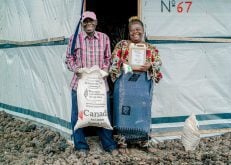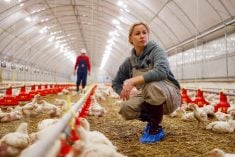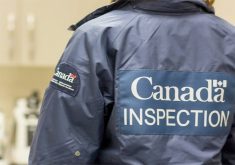PARIS (Reuters) — U.S. Agriculture Secretary Tom Vilsack said on Wednesday he was confident a vaccine approved this week by the U.S. administration would help fight a deadly virus which has killed millions of pigs in the United States.
The U.S. Department of Agriculture said on Wednesday preliminary studies of a vaccine developed by Harrisvaccines “have been promising” in controlling porcine epidemic diarrhea virus. The virus has killed up to eight million pigs and pushed pork prices to record highs since it was first identified in the United States last year.
Read Also

B.C. ostriches culled, CFIA confirms
Ostriches on an embattled Edgewood, B.C. farm have been culled after a prolonged legal battle, the Canadian Food Inspection Agency has confirmed.
“I don’t want to say the virus will be eradicated, but I think you will see we’re on the other side of this,” Vilsack said after a speech to representatives of the French farm sector at the U.S. embassy in Paris.
He added that warmer temperatures over the summer would weaken the virus, while systematic notification by farmers of new PED cases and higher biosecurity measures at farms will help in the fight against PED.
Vilsack ordered farmers earlier this month to start reporting cases of the deadly pig virus and pledged over $26 million in funding to combat the virus, pushing back against criticism of his handling of the outbreak.
Harrisvaccines’ product is the first to win U.S. Department of Agriculture conditional approval, which means it can be sold over the counter, but the company must continue to test its effectiveness.
“Hopefully, by the end of the year, we will be in a situation where we can say, ‘yes, folks, (the vaccine) works,’ start producing mass quantities of it so that farm producers around the world will not have to worry about this,” Vilsack said.
He said the virus, which causes diarrhea and vomiting and is nearly always lethal to baby piglets, was a global issue and not just a U.S. problem. PED has been found in other countries including Japan, Canada and Mexico.
The crisis and the severity of the virus have disrupted international pig trading, with 11 countries or regions, including Russia, the European Union, China and Japan limiting imports of live hogs.
The head of the Paris-based World Animal Health Organisation OIE, who met Vilsack earlier in the day, welcomed the new vaccine and said there were indications the virus, which has wiped out an estimated 10 percent of U.S. pigs, was subsiding in North America.
“We have the feeling that it’s settling down in the United States and Canada. It’s going in the right direction,” Bernard Vallat told Reuters by phone.
“The fact that (the vaccine) successfully passed the tests to be authorized is good news,” he said.
However, he said that further tests would need to be done on whether there is a risk that vaccinated animals can continue to be contagious without being sick.
Vilsack is on a European tour this week which started in Luxembourg and Brussels where discussions focused on the U.S.-European Union Transatlantic Trade and Investment Partnership, which he insisted should sweep away “non-scientific barriers” to U.S. sales.














